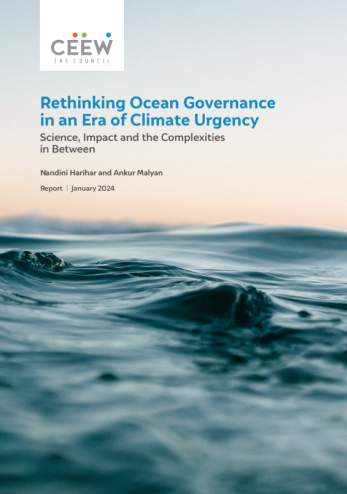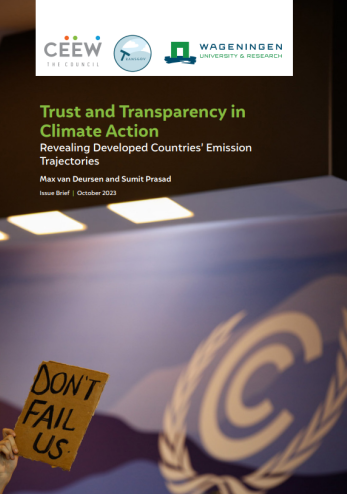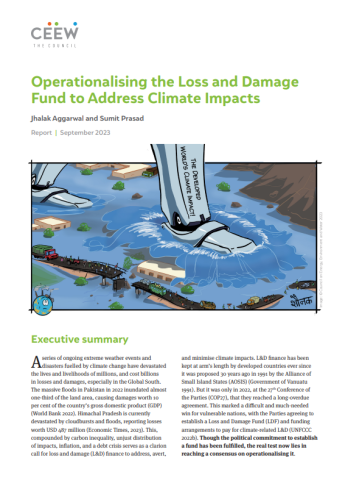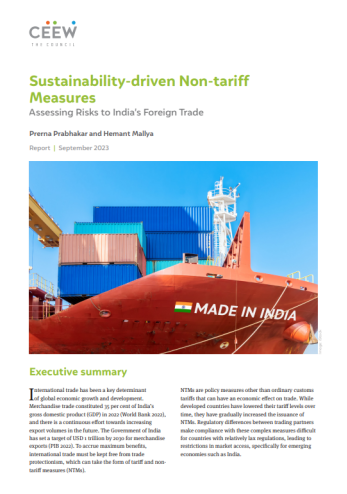Issue Brief
Multilateralism for Chronic Risks
Arunabha Ghosh
June 2020 | International Cooperation
Suggested citation: Ghosh, Arunabha. 2020. “Multilateralism for Chronic Risks.” UN75 Global Governance Innovation Perspectives. Washington, D.C.: Stimson Center, Doha Forum, and Council on Energy, Environment and Water.
Overview
This brief, published as part of the UN75 Global Governance Innovation Perspectives series, examines the idea of multilateralism through a new lens. It suggests that the 75th anniversary of the United Nations is an opportunity to reorient multilateralism towards the most pressing challenges of today – the tail end risks of low probability which could be potentially catastrophic – rather than overhauling the entire global governance architecture. The brief emphasises that assessing the vulnerability and capacity of countries to deal with environmental stresses and shocks is crucial in this context. It recommends a Climate Risk Atlas for developing countries and a Global Risk Pooling Reserve Fund to tackle these systemic risks.
Key highlights
- A perfect storm of shocks looks like this: a series of environmental, economic, and social crises that overwhelm the capacity of states and communities to respond, adapt, and rejuvenate.
- Multilateralism for chronic risks would rest on two pillars: transparency and risk pooling.
- The gravest concerns are about tail-end risks, i.e. risks with low probabilities of occurrence, but which can be catastrophic. The COVID-19 pandemic is one such risk, as are severe climate shocks.
- Past shocks and the coronavirus pandemic underscore that tipping points need not be physical alone. It certainly matters what we do to the planet and what the planet does to us.
- Currently, multilateral environmental agreements (MEAs) lack effectiveness for several reasons: fragmented and diffused governance structures, MEAs without a clear hierarchical relationship between each other and with other key international legal instruments, missing coherence and coordination for a functional division of tasks, and lack of transparency and accountability across institutions.
- The international community may have to settle for de minimis multilateralism: what is the minimum on which interests converge? In the post-pandemic era, multilateralism cannot be taken for granted. We can still drive international cooperation on specific issues of common concern.
- When international cooperation is ebbing, renewed drive for collective action can come from the way we organise multilateral institutions to act in the collective interest of responding to shocks, whether they be health-related, environmental, or financial.
Key recommendations
- Prioritise a Climate Risk Atlas for developing countries. Such an atlas would focus on critical vulnerabilities: costs, urban heat stress, water stress, crop loss, and biodiversity collapse.
- Develop an international Climate Risk Index (with annual updates and improvements in methods) that draws on the data first gathered under the Climate Risk Atlas. The relevant arms of the UN, along with insurance agencies, must be some of the contributors involved in the project.
- Set up a Global Risk Pooling Fund that would have three premises.
- Different countries face different kinds of climate risks. By pooling risks, the peaks of risk curves could be lowered for individual countries.
- The fund would not require initial payments of public money. The nominal capitalisation of the reserve fund could be based on a voluntary allocation of a share of a country’s Special Drawing Rights (SDRs) in the International Monetary Fund.
- The fund would assume an initial loss but would transfer the bulk of the subscribed risk to existing market insurance mechanisms. The reserve fund would be a way to bridge major insurance firms on one hand and developing countries (as well as stressed communities in developed countries) on the other.
We must reorient multilateralism towards chronic risks to avoid the tragedies that might befall all of humankind. With the 75th anniversary of the UN around the corner, the time is now to enhance transparency and risk pooling in this global endeavour, to which the Risk Atlas for developing countries and a Global Risk Pooling Reserve Fund recommended in this paper, can provide a crucial contribution.








